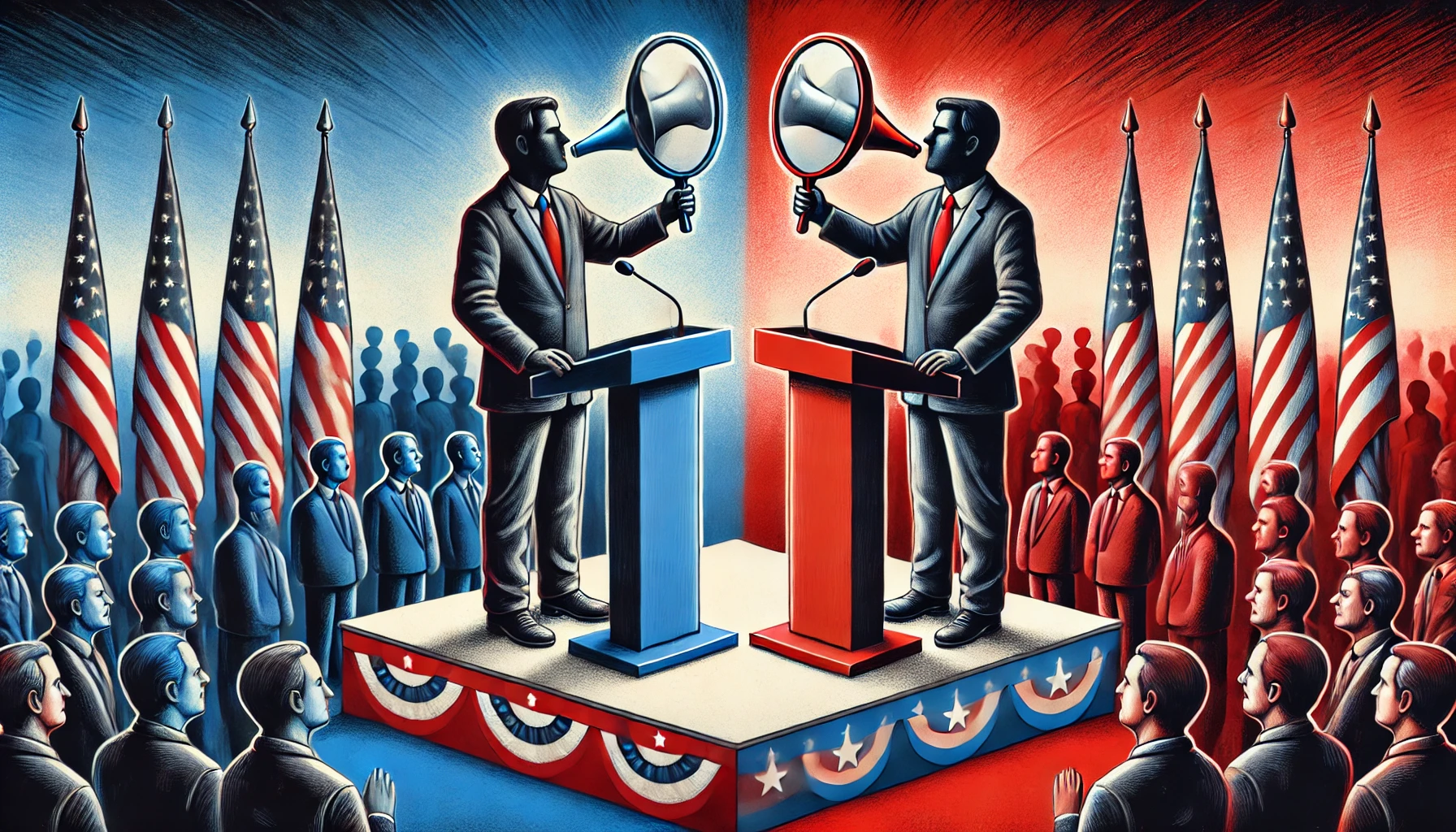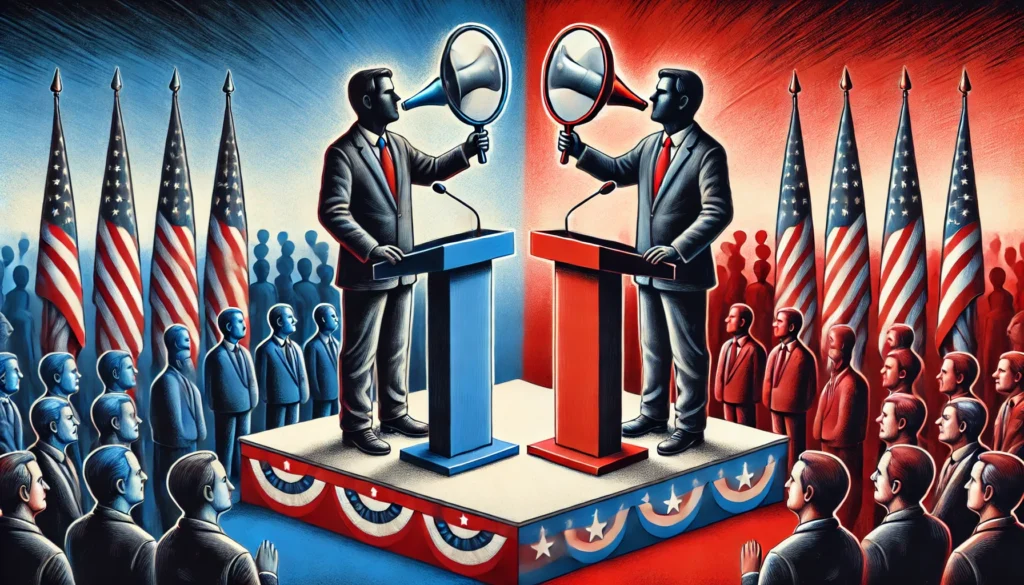
Before you read further, be warned: This entire article is a trigger, and at some point, you will likely want to stop reading and start arguing. That reaction, in itself, is proof of the problem. American politics has devolved into a realm where ideological loyalty trumps reason, hypocrisy is excused when it benefits one’s side, and logical fallacies are used as weapons rather than tools for discourse. Both the left and right claim to champion truth and justice, yet both sides engage in contradictory rhetoric that undermines their credibility.
If you feel the urge to mentally “but what about” your way through this article—congratulations, you’ve just become the latest example of America’s biggest political problem.

Hypocrisy on the Left (Trigger)
One of the left’s most glaring inconsistencies lies in its stance on free speech. Progressive leaders and activists often champion the importance of First Amendment rights—particularly regarding social justice movements—yet there is a growing trend of suppressing dissenting opinions through “cancel culture” and speech regulation on college campuses. For example, in 2021, numerous universities disinvited conservative speakers due to student backlash, arguing that their views were “harmful” or “dangerous.” However, the same institutions celebrated the importance of open dialogue when progressive speakers addressed controversial topics. This selective application of free speech contradicts the principle of open discourse that progressives claim to support.
Another hypocrisy is the left’s approach to economic policy. Many progressive politicians advocate for higher taxes on the wealthy to fund social programs, arguing that “the rich must pay their fair share.” Yet, figures like Senator Bernie Sanders and Representative Alexandria Ocasio-Cortez, who push for policies like wealth redistribution, have been criticized for engaging in capitalist ventures themselves. Sanders, who rails against income inequality, has accumulated a net worth exceeding $2 million and owns multiple properties—an economic reality at odds with his rhetoric against wealth accumulation.
Logical Fallacies on the Left
One common fallacy used by progressives is the straw man argument, where they misrepresent conservative views to make them easier to attack. A frequent example is equating opposition to government-funded universal healthcare with a lack of concern for human life, rather than acknowledging conservative arguments about economic sustainability and government inefficiency.
Another is the appeal to emotion, which is often employed in debates on social issues. While empathy is vital, relying solely on emotion without factual backing weakens arguments. For instance, during discussions on gun control, many activists highlight tragic mass shootings while ignoring data showing that most gun violence occurs in cities with strict gun laws, making the issue far more complex than simply banning firearms.
Hypocrisy on the Right (Trigger)
Conservatives frequently present themselves as champions of limited government and personal freedom—until it conflicts with their agenda. A clear example is their stance on corporate regulation. Many conservatives argue that businesses should be free from excessive government intervention, advocating for lower taxes and deregulation to foster economic growth. Yet, when companies like Nike, Bud Light, or the NFL express support for progressive social causes, the same conservatives who champion free markets call for boycotts and government action against these businesses. This selective application of free-market principles reveals a contradiction: Do businesses have the right to operate as they please, or only when they align with conservative values?
Another contradiction is in the right’s stance on state versus federal authority. Conservatives often argue that states should have the power to govern themselves with minimal federal interference. However, when states like California or New York enact progressive policies on climate change, gun control, or minimum wage increases, many conservatives push for federal intervention to override these laws. The inconsistency highlights that their advocacy for state rights is often conditional on whether the state is pushing conservative policies.
Logical Fallacies on the Right
A prevalent fallacy among conservatives is the false equivalence, often seen when discussing political bias. Many argue that “both sides” are equally responsible for issues such as media manipulation, despite significant disparities in how misinformation spreads. Studies have shown that right-leaning media outlets, particularly social media-driven sources, spread more verifiably false stories than mainstream outlets, yet conservatives often insist that all media outlets are equally untrustworthy.
Another frequent fallacy is the hasty generalization, in which broad conclusions are drawn from limited or anecdotal evidence. For example, conservatives often point to individual cases of voter fraud as proof of widespread election rigging, despite extensive studies showing that such cases are statistically insignificant. Similarly, the notion that crime is out of control nationwide is often based on cherry-picked examples from major cities, even though FBI crime data shows that violent crime rates have generally declined over the past few decades. This kind of oversimplification distorts public perception and fuels unnecessary fear.
The Bigger Issue: Blind Partisanship
The core problem behind these hypocrisies and logical fallacies is the prioritization of party loyalty over rational discussion. The left and right both engage in confirmation bias, cherry-picking facts that support their views while ignoring contradictory evidence. Social media amplifies this effect, as algorithms feed users content that reinforces their existing beliefs, creating ideological echo chambers that further entrench political divisions.
Instead of engaging in meaningful debate, many Americans now see political affiliation as a defining moral trait, demonizing the opposition rather than considering their perspectives. The result is an environment where hypocrisy thrives unchecked, and logical fallacies become the foundation of political discourse.

Conclusion
Both conservatives and progressives claim to stand for truth and justice, yet both sides frequently engage in hypocrisy and flawed reasoning. The unwillingness to acknowledge contradictions and biases prevents progress and fosters a toxic political landscape. If Americans hope to move forward, they must hold their own parties accountable, engage in critical thinking, and prioritize consistent principles over partisan allegiance. Without this shift, the cycle of illogical rhetoric will continue to dominate the national conversation, leaving real issues unresolved.
Brent is the Managing Partner of CatchMark Technologies and a seasoned technologist with over 25 years of experience in IT leadership, cybersecurity, and technical operations. He began his career serving in the U.S. Army, where he worked extensively with electronics—laying the foundation for his lifelong passion for technology and problem-solving. Brent holds a Certified Information Systems Security Professional (CISSP) certification and currently leads CatchMark’s Cybersecurity and Tech Support teams. Known for his strategic thinking and hands-on expertise, he excels in guiding secure, scalable solutions and driving innovation across complex technical environments.
Must See
-


Community
/ 15 hours agoPetunia Patrol: Keeping White Lake Beautiful
Each summer, the streets of Montague and Whitehall burst into color, lined with lush,...
By Amy Yonkman -


Arts/Entertainment
/ 18 hours agoWhite Lake Area Live Music Lineup: June 2–8, 2025
Eight Whitehall and Montague venues are bringing the music this week, with 21 live...
By Amy Yonkman -


Community
/ 2 days agoFishing the White Lake Region: A Late May 2025 Update
As we approach the end of May, anglers in the White Lake area, encompassing...
By Kara Raeth











